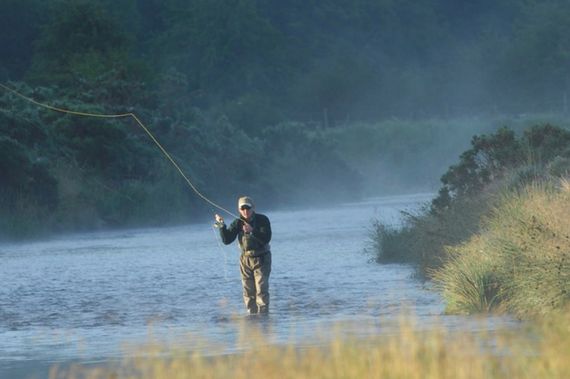New fishing byelaws come into force on Wye and Usk

Natural Resources Wales (NRW) is introducing restrictions on salmon and sea trout fishing on the River Wye (in Wales) and the Usk in response to the decline in migratory fish stocks.
New byelaws have been confirmed by the Minister for Rural Affairs and North Wales, and Trefnydd, Lesley Griffiths, following a period of consultation.
The byelaws are part of NRW’s commitments to restore Welsh salmon and sea trout stocks, set out in the Salmon and Sea Trout Plan of Action.
The introduction of byelaws is in response to the ongoing decline in migratory salmon stocks. Numbers are currently among the lowest on record and are below sustainable levels.
The new byelaws for the Wye and Usk rod fishery will require mandatory catch and release of all salmon caught, as well as providing increase protection for sea trout.
The existing byelaws mandating catch and release on the Wye and Usk, expired in December and new byelaws are necessary to ensure stocks continue to be protected.
NRW has worked with the Environment Agency to bring in the same protections for salmon and sea trout on the River Wye in England, maintaining a consistent catchment approach for the cross-border river.
The byelaws come into force on 1 March 2022 and will be in place until 31 December, 2029, to coincide with the end of the ‘All Wales’ and ‘Cross Border Rivers’ byelaws.
The byelaws require:
River Wye
- Mandatory catch and release of all salmon and sea trout
- Revised end date for the salmon season so that it runs from 3 March to 17 October for the whole river and tributaries
River Usk
- Mandatory catch and release fishing of all salmon
- Mandatory catch and release of all sea trout caught before 1 May
These byelaws are just part of the work that NRW, fisheries interests and partner organisations are carrying out across Wales to support the recovery and long-term future sustainability of salmon and sea trout stocks and fisheries.
Both are iconic species, requiring good river habitat and cool, clean water to thrive. They demonstrate to society the environmental quality of our rivers, whilst also providing important opportunities for healthy and valuable recreation.
Ben Wilson, Principal Fisheries Advisor for Natural Resources Wales, said:
“While these byelaws are important to reduce exploitation, they are just one of the many actions that we are undertaking to protect and restore salmon and sea trout stocks in Wales.
“Within the ‘Salmon and Sea Trout Plan of Action’ we have identified ongoing and new actions needed to address the pressures affecting our fish populations.
"These range from tackling physical habitat constraints and safeguarding water quality and quantity in our freshwater environment; to understanding marine pressures and new and emerging pressures such as climate change.
“We have also recently launched the SAC Rivers Project which focusses on phosphate pollution and includes the Usk and Wye; and the 4 Rivers for LIFE project – a £9.1m, 5-year collaborative project which will carry out a range of measures to address diffuse pollution as well as improving habitat quality within the rivers Usk, Twyi, Teifi and the Cleddau.
“Salmon and sea trout are precious and iconic species, and we all have to do what we can to preserve them. We will keep working with our partners and all those with a stake in our river environments to protect our fish and fisheries for future generations to enjoy.”
In addition to the Wye and Usk byelaws, NRW is introducing new byelaws to protect salmon and sea trout on the River Severn in Wales.
The byelaws on the Severn require:
- The mandatory release of all salmon and sea trout caught by rod and line,
- Restrictions to angling fishing methods in order to improve the handling and survival of released salmon, including:
- Ban on all bait fishing for salmon and sea trout
- The mandatory use of barbless hooks
- Restrictions on hook type, size, and their number
The Severn byelaws will be in place for ten years.
